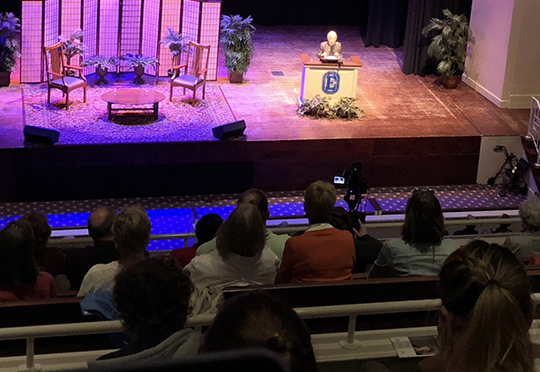At 7:30 p.m. Wednesday, April 11, Karen Armstrong, historian of world religions, visited Elizabethtown College’s Leffler Chapel to discuss her views on peacemaking. Leffler was filled with people ranging from community members to college students.
Armstrong, Most Excellent Order of the British Empire and founder of the Charter for Compassion, is one of Britain’s leading commenters on the subject of religion. As a young teenager, she entered a convent. Seven years later, however, she left, becoming an author, student, teacher, TV producer and speaker. She wrote numerous books including “Through the Narrow Gate,” “The End of Silence: Women and the Priesthood,” “The Great Transformation: The Beginning of Our Religious Traditions” and “Fields of Blood: Religion and the History of Violence.”
The Judy S. ‘68 and Paul W. Ware Lecture on Peacemaking is the Center for Global Understanding and Peacemaking signature event and was made possible by a sustaining donation by the Wares.
One of the phrases Armstrong reiterated over the course of the evening was “Treat others the way you would like to be treated.” To her, this motto focuses on compassion between one another. Everyone is born with compassion, yet not everyone shows it. Therefore, “unless human beings learn to cooperate with one another, they will destroy each other,” said Armstrong.
Treat others the way you would like to be treated.”
The author stated that she believes that many people involve themselves in religion “because [they] want to be transformed” in one way or another. That was her reason for joining the convent, she said. She continued by stating that as a society, we have created a limited view or opinion of God and the Divine. We have limited ourselves by believing that becoming transformed means that we as people will be altered in more superficial ways, which is not what transformation is.
Armstrong raised the point that the United States and Great Britain are two of the richest countries in the world and, yet, we do not do enough for countries that do not have the same economical advances. One example she offered was when some watched the news, they no longer watch or listen when a warning comes on that something that might cause distress is about to appear, because we feel as though it is not our problem, or we become uncomfortable by the situation presented.
Kira Kuhar, a junior business major, said she felt that Armstrong made an interesting point while discussing this topic. “Ms. Armstrong talked about the egotistical nature of humans. I think she’s right. Contrary to popular belief, we can’t multitask. We can’t focus on ourselves and on others at the same time, and, to be more compassionate, we need to focus solely on others.
“We need to take ourselves out of the equation, and really focus on trying to understand others around us, especially those with different backgrounds from our own,” continued Kuhar.
“This is the only way the world is going to get better. The problems in the world are caused by our incapability to look past our own self-interests and look out for others. If we want to solve the world’s problems, then, as Ms. Armstrong suggested, we need to develop true compassion, especially for our enemies.”
Another student, Brooke Mazzone, a junior social work and Spanish major, agreed with Armstrong’s view that “religious interpretations that encourage violence and hate are illegitimate.”
Armstrong said that compassion “demands that you place yourself on the backburner. Compassion does not mean pity or mercy. It does not mean you feel sorry for yourself,” instead, compassion “means you are equal.”
Hannah Seaver bio:
Hannah Seaver is a junior English professional writing major with a minor in creative writing. She is the fiction editor of Elizabethtown College’s literary magazine, “Fine Print.” She aspires to, one day, work in publishing as a book editor and eventually own her own publishing company.


